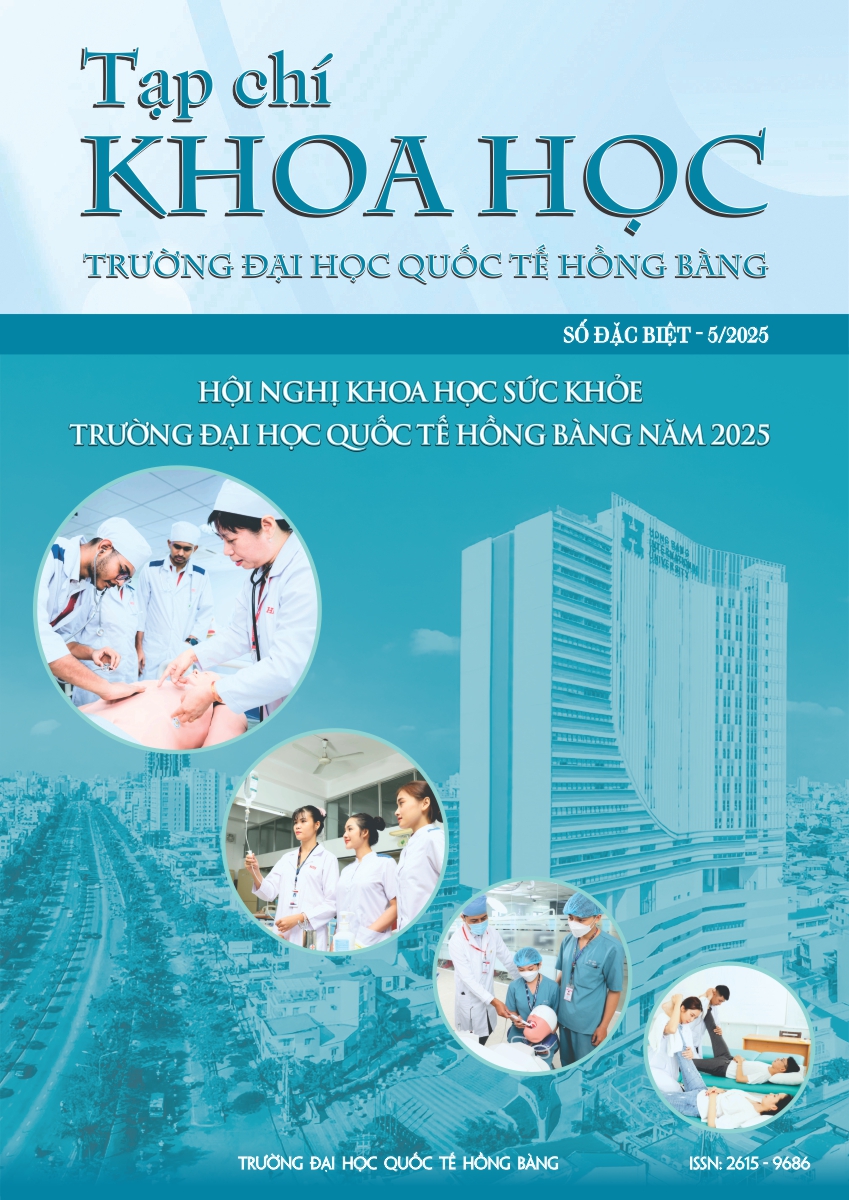TỔNG QUAN NGHIÊN CỨU VỀ CHẾ ĐỘ ĂN THỰC DƯỠNG TRONG KIỂM SOÁT VIÊM LOÉT DẠ DÀY
Các tác giả
DOI: https://doi.org/10.59294/HIUJS.KHSK.2025.016Từ khóa:
viêm loét dạ dày, chế độ ăn thực dưỡng, chế độ ăn BRAT, chế độ ăn Địa Trung Hải, hệ vi sinh đường ruộtTóm tắt
Viêm loét dạ dày là một bệnh lý phổ biến của hệ tiêu hóa, ảnh hưởng đến sức khỏe và chất lượng sống của người bệnh. Chế độ ăn uống đóng vai trò quan trọng trong kiểm soát và điều trị bệnh, đặc biệt là chế độ ăn thực dưỡng. Nghiên cứu này nhằm tổng hợp các bằng chứng khoa học về tác động của chế độ ăn thực dưỡng đối với viêm loét dạ dày, đồng thời so sánh với chế độ ăn BRAT (BRAT là viết tắt của Banana, Rice, Applesauce, Toast - nghĩa là Chuối, Cơm trắng, Sốt táo, Bánh mì nướng) và Địa Trung Hải. Nghiên cứu được thực hiện theo phương pháp tổng quan tài liệu (literature review) từ các cơ sở dữ liệu y khoa như PubMed, Google Scholar và các tạp chí khoa học trong nước. Các nghiên cứu được lựa chọn dựa trên tiêu chí có liên quan đến chế độ ăn thực dưỡng và viêm loét dạ dày, đồng thời đảm bảo phương pháp nghiên cứu rõ ràng. Kết quả nghiên cứu cho thấy chế độ ăn BRAT giúp giảm triệu chứng viêm loét dạ dày trong giai đoạn cấp tính, nhưng không phù hợp để áp dụng lâu dài do thiếu hụt dinh dưỡng. Chế độ ăn Địa Trung Hải có lợi ích trong việc giảm viêm và bảo vệ niêm mạc dạ dày. Chế độ ăn thực dưỡng hỗ trợ cải thiện hệ vi sinh đường ruột, giảm viêm loét và ổn định axit dạ dày, nhưng có thể thiếu protein và một số vi chất quan trọng. Kết luận từ nghiên cứu này nhấn mạnh rằng bệnh nhân viêm loét dạ dày nên áp dụng chế độ BRAT trong giai đoạn cấp tính, sau đó chuyển sang chế độ ăn Địa Trung Hải hoặc Thực dưỡng để phục hồi và duy trì sức khỏe lâu dài. Nghiên cứu cũng đề xuất cần có thêm các nghiên cứu lâm sàng quy mô lớn hơn để đánh giá hiệu quả dài hạn của các chế độ ăn này.
Abstract
Gastric ulcers are a common gastrointestinal disorder that significantly impacts patients’ health and quality of life. Dietary management plays a crucial role in both the treatment and prevention of the condition, with the macrobiotic diet being of particular interest. This study aims to compile and synthesize scientific evidence regarding the effects of the macrobiotic diet on gastric ulcers, in comparison with the BRAT and Mediterranean diets. The research employs a systematic literature review methodology, analyzing studies retrieved from medical databases including PubMed, Google Scholar, and domestic scientific publications. Studies were selected based on their relevance to the macrobiotic diet and gastric ulcers, ensuring a clear research methodology. The findings indicate that the BRAT diet helps alleviate gastric ulcer symptoms during the acute phase but is unsuitable for long-term application due to nutritional deficiencies. The Mediterranean diet provides anti-inflammatory benefits and protects the gastric mucosa. The macrobiotic diet supports gut microbiota balance, reduces ulceration, and stabilizes gastric acid levels but may lack protein and certain essential micronutrients. The study concludes that patients with gastric ulcers should adopt the BRAT diet during the acute phase, followed by a transition to the Mediterranean or macrobiotic diet for long-term recovery and health maintenance. The study highlights the need for further large-scale clinical trials to evaluate the long-term efficacy and safety of these dietary approaches.
Tài liệu tham khảo
[1] N. T. Hong, V. N. Tran, and T. M. Le, “Chế độ ăn thực dưỡng và tác động đến sức khỏe tiêu hóa: Nghiên cứu tổng quan,” Tạp chí Dinh dưỡng Việt Nam, vol. 56, no. 4, pp. 112-125, 2020.
[2] J. J. Y. Sung, E. J. Kuipers, and H. B. El-Serag, “Systematic review: The global incidence and prevalence of peptic ulcer disease,” Aliment. Pharmacol. Ther., vol. 51, no. 6, pp. 579-595, 2020.
[3] P. Malfertheiner, F. K. L. Chan, and K. E. L. McColl, “Peptic ulcer disease,” Lancet, vol. 390, no. 10094, pp. 613-624, 2017.
DOI: https://doi.org/10.1016/S0140-6736(16)32404-7[4] Y. Zhao, B. Chen, and J. Li, “Role of diet in the management of peptic ulcer disease: A review of current evidence,” World J. Gastroenterol., vol. 25, no. 25, pp. 3151-3161, 2019.
[5] A. C. Ford, P. Moayyedi, and C. J. Black, “Gastric ulcers: Pathogenesis, diagnosis, and management,” Lancet Gastroenterol. Hepatol., vol. 6, no. 2, pp. 142-156, 2021.
[6] A. Tursi, “Nutritional approaches in gastrointestinal diseases: From evidence to clinical practice,” Clin. Nutr. ESPEN, vol. 38, pp. 63-70, 2020.
[7] R. K. Smith, M. L. Johnson, and T. J. Williams, “The effectiveness of the BRAT diet in the management of acute gastric distress,” J. Gastroenterol. Res., vol. 45, no. 3, pp. 245-259, 2018.
[8] J. H. Kim, S. Y. Park, and Y. J. Lee, “Comparative study on the Mediterranean diet and gastric ulcer recovery,” Int. J. Digest. Dis., vol. 63, no. 1, pp. 78-92, 2021.
[9] T. H. Nguyen, D. M. Tran, and V. T. Le, “Macrobiotic diet and its impact on digestive health: A Vietnamese perspective,” Vietnam Med. J., vol. 56, no. 4, pp. 112-125, 2020.
Tải xuống
Tải xuống: 345











